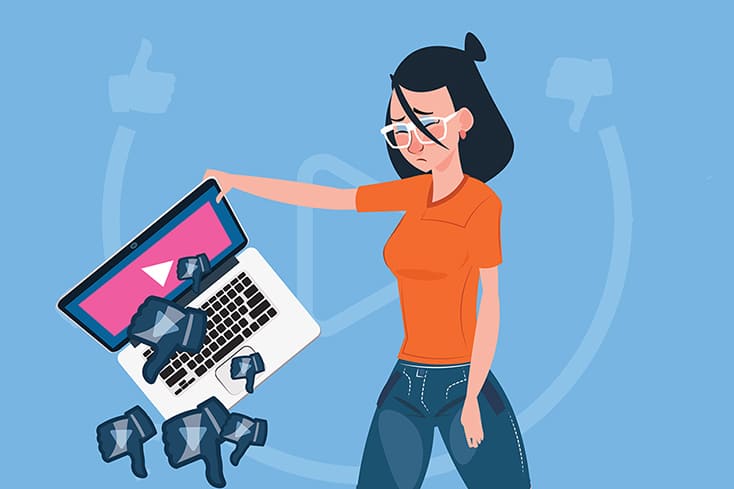December 16, 2020
By Candice Alaska

Hollywood has a long history of misrepresenting those with mental health conditions. These representations are usually portrayals of people with mental illness as violent and dangerous, which contribute to harmful stereotypes about mental illness.
Inaccurate representations of mental illness create barriers to reducing stigma, forcing mental health advocates to work overtime to undo these damaging stereotypes. We need the entertainment industry to start accepting responsibility for the role they have in the mental health movement.
Showing People with Mental Illness as Violent
There have been very few representations of schizophrenia in Hollywood that were not violent. In the comedy, “Me, Myself and Irene,” Jim Carrey’s character is supposed to represent a man with schizophrenia, but it is actually a representation of dissociative identity disorder (DID). Not only does it contribute to the common misconception that schizophrenia means having multiple personalities, it portrays one of those personalities as violent, promoting one of the most common stigmas associated with schizophrenia.
When an illness that has very little understanding by the general public becomes represented on the big screen, that representation becomes many people's understanding of it. Former NAMI Executive Director Laurie Flynn once said of Jim Carrey's character in “Me, Myself and Irene,” “This character's violent, unpredictable behavior will be unfairly associated with having schizophrenia. It's terribly stigmatizing.”
Additionally, Hollywood tends to portray DID as a condition that makes a person violent and murderous. One example is the film “Split,” about a man with 24 different personalities who kidnaps and imprisons three teenage girls in an isolated underground facility.
According to an article in Mental Health Today, “After some friends and family of those with DID watched the film, there have been stories and desperate pleas from a person diagnosed being isolated from friends, thrown out of home by family, losing their job at work, and even having their children reported to social services with nothing more than the previously nice neighbors watching this so-called ‘just a film.’”
The Netflix series “Locke and Key” is a more recent addition to the misrepresentation damage. In it, a character that has committed murder has borderline personality disorder (BPD). BPD is another heavily stereotyped illness, and some of the misconceptions around it include that people with it are manipulative, hurtful and dangerous. The character’s diagnosis is not mentioned anywhere else in the series and does not add to the character or plot in any meaningful way except to explain his violent tendencies.
Using “Psychotic” as an Insult
Of all the mental health symptoms to be devastatingly misrepresented, perhaps the most stigmatized one is psychosis. In fact, psychosis has been so heavily misunderstood that “psychotic” remains an extremely common on-screen insult, used to mean that someone is “violent,” “crazy” or “dangerous.”
Shows that are guilty of this range from the comedy-drama series “Jane the Virgin,” in which “psychotic” is thrown around as an insult very frequently, to the comic book film adaptation “The Dark Knight,” where Gotham’s District Attorney Harvey Dent asks if his girlfriend has “any psychotic ex-boyfriends I should know about?”
Of course, this isn’t the only time that “psychotic” is used as a casual insult in films. In the movie “Suicide Squad,” a crew of dangerous criminals is scathingly referred to as “psychotic, anti-social freaks.” In “Batman Vs. Superman,” Lois Lane tells villain Lex Luthor, “you’re psychotic,” after he reveals his plan to murder Superman. And in “The Dark Knight Rises,” Batman says to of one of the Joker’s accomplices, “He’s a paranoid schizophrenic…What could you expect to learn from someone like him?”
It’s important to remember that when we’re using people’s mental health conditions as insults, there are very real consequences to the people living with these conditions. Connecting mental illness and violence can not only contribute to stigma, but it can also lead to fewer people seeking the treatment they need.
We Need a Change in The Entertainment Industry
We already exist in a world entrenched in discrimination against mental illness, and that discrimination can severely impact people's quality of life in many different ways. To add to that discrimination through thoughtless and inaccurate representations is unkind and very dangerous.
There are many ways to tell a compelling story; using an inaccurate portrayal of mental illness as a horror element or as an explanation for violence in a character should not be one of them.
I hope one day soon we see measures that enforce responsible portrayals of mental illness in Hollywood and begin to undo some of the damage that films like these cause.
Regulating representation of mental illness in the film industry is an integral part of the mental health movement’s efforts to eliminate stigma. We cannot keep allowing entertainment to have this level of impact on people’s lives. No matter the profits, the cost is just too high.
Candice Alaska is a mental health advocate with borderline personality disorder. She is the founder of www.notokaytt.org, a social media-based platform dedicated to de-stigmatizing mental illness in Trinidad and Tobago by amplifying the knowledge of mental health professionals and the voices of people with lived experience.
Submit To The NAMI Blog
We’re always accepting submissions to the NAMI Blog! We feature the latest research, stories of recovery, ways to end stigma and strategies for living well with mental illness. Most importantly: We feature your voices.
LEARN MORE